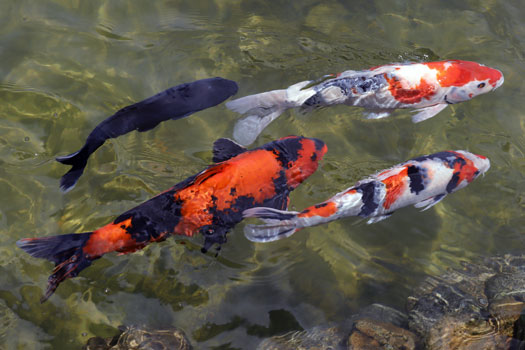- Your shopping cart is empty!
Can Cold Water Kill Koi Fish?

It’s easy to think of koi as a tropical species because they’re known to thrive in regions with moderate climates. However, their natural habitats in Asia tend to feature seasonal cold water temperatures. Koi are the ornamental variety of Asian carp, hardy and resilient fish that enjoy swimming in freshwater lakes and streams. The truth about both Asian carp and koi is that they may not survive freezing temperatures under some conditions. The knowledgeable staff at Aquatic Warehouse, a leading provider of koi pond supplies, has some details to share about whether koi fish can survive in cold water.
Koi Freshwater Latitudes
Asian carp are excellent aquaculture fish because they thrive in rice paddies, thus giving farmers a double edible harvest. Geographically, the region between the 54th parallel north down to the 21st parallel is where Asian carp live, and this coincides with rice cultivation lands in Asia and the Great Lakes of North America. In these latitudes, Asian carp and koi can survive zero degree water temperatures, but not under the frozen surfaces, so they’ll swim away from icy spots.
How Koi Regulate Their Metabolism
Similar to many aquarium fish, koi are able to adjust their metabolism to survive various water temperatures. This biological property is known as poikilothermic, which basically means koi are cold-blooded species similar to many reptiles and amphibians. When temperatures drop, koi will seek the warmest part of the pond, which happens to be the bottom, but their swimming behavior will slow down to moving just enough so their fins and muscles don’t freeze. If the koi in your pond are used to eating food that sinks to the substrate, they’ll patiently wait for it instead of swimming to the colder surface.
When Koi Don’t Survive the Winter
As previously mentioned, Asian carp and koi will swim away from frozen surfaces, but this isn’t an option in a garden pond. The reason they avoid surface ice is because the gaseous exchange they need to breathe is disrupted by the ice. A frozen pond is a dangerous habitat for koi because they’ll likely suffocate. The water temperature of a pond can be close to zero degrees, but if the aeration system prevents the formation of ice, koi can survive a very long winter without complications.
De-Icing Garden Ponds
If you keep a koi pond in the southern United States, where even the harshest winters don’t result in water turning into sheets of ice, you don’t have to worry about the temperature of your pond, unless of course you live in the mountains. Things are different for pond keepers around New England, the Midwest, and the Great Lakes, where frozen surfaces are far more likely to happen. As long as you can punch a few large holes on the ice, your koi should be fine, but don’t do this forcefully because the stress of the acoustic shock waves could injure the fish. A pond de-icing unit rated at about 100 watts is a better option. The small holes created by these devices are all your pond needs to facilitate a gaseous exchange.
No matter what time of year and how high or low the temperatures are, you always need to have all of the essential supplies on hand to properly care for your koi pond. Filters, lighting, pumps, vacuums, and much more can be found at Aquatic Warehouse. Take a look at our vast selection on our website, stop by our store in Kearny Mesa, and don’t hesitate to call us with your questions at 858-467-9297.
